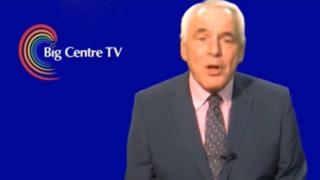
Image copyrightBig Centre TVImage caption Birmingham's Big Centre TV has been replaced Media regulator Ofcom has proposed scrapping the further roll-out of local TV channels across the UK, citing concerns over "economic viability".More than 30 local TV stations have already been set up in the UK as part of a plan laid out in 2011 by then culture secretary Jeremy Hunt.But several of the channels have faced financial difficulties and have struggled to attract an audience.Ofcom has now proposed scrapping the roll-out of further local channels."Requiring new infrastructure to be built for additional local TV channels is not, in our current view, economically viable.
It could also undermine the many local services already on air," a spokeswoman said.Mr Hunt's vision was for major towns and cities in the UK to have their own local TV stations.
The business model is successful in the US, but local stations there are usually affiliated with a larger television network such as Fox or NBC.In May 2012, companies were invited to apply for a licence to broadcast in major cities including Belfast, Cardiff, Glasgow and London.Image copyrightThat's ManchesterImage caption That's TV now owns several local licences Money was taken from the TV licence fee to finance some start-up costs, including the cost of building transmission infrastructure.Successful bidders were given a prominent channel number on digital terrestrial television (Freeview), but they were also obliged to produce a quota of local news as part of their licence agreement.
Since the first service launched in 2013:several stations - including the capital's service London Live - have asked Ofcom to reduce their local news obligationsmany of the stations have been ridiculed for the poor quality of their output or have been reported to Ofcom for breaching broadcasting rulesseveral stations have merged operations and now broadcast non-local programmes to save moneySTV won the broadcast licence for several cities in Scotland including Glasgow, Aberdeen and Ayr.
However, its local STV2 service is loss-making and in March the company said it was conducting a "strategic review" of its operations.Ofcom had identified 13 further locations as local TV candidates, but said it was now minded to end the roll-out."Most licences for locations with a household coverage of under 50,000 have not managed to attract viable applications," it said in its statement.It also suggested the cost of building transmission infrastructure was prohibitive, since the BBC was no longer required to fund it.Ofcom has invited companies to respond to its proposals.

 7
7






